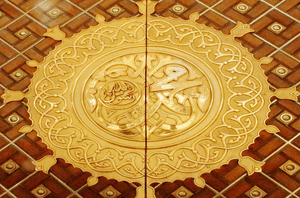A powerful way to attain khushūʿ in ṣalāh is to reflect upon the Qur’ān. This is known as ‘tadabbur’ in Arabic.
The Qur’ān is the eternal book of guidance. It is a cure for every disease – be it spiritual or physical. It is a light which illuminates the path of truth amidst the darknesses of falsehood. The Qur’ān contains legal rulings for a human to live on Allah’s earth, as His subservient slaves. It is a book of blessings and eternal wisdom; a warner and a giver of good news.
Accordingly, reciting the Qur’ān or memorising its words is in itself not enough. Although both of these acts are essential, they must be accompanied by reflection and a deep commitment to ‘live’ the Qur’ān.
We find that the majority of the Muslims today have limited themselves to repeating the words (of the Qur’ān) and chanting it melodiously in funerals, graveyards and homes, and to carrying muṣḥafs or abandoning them in the homes. And they forgot – or appeared to forget- that the greatest blessing of the Qur’ān is in fact in reflecting upon its verses, seeking to understand it, embodying it as one’s character, acting upon its commands and staying away from its prohibitions.” (al-Zarqānī (raḥimahullāh)
Allah says,“ Do they not, then, ponder upon the Qur‘ān? Had it been from someone other than Allah, they would have found in it a great deal of discrepancy” (4:82). and “This is a blessed Book which We revealed to you, so that they reflect upon its verses, and those with understanding may take heed” (38:29);
Imām al-Qurtubī (raḥimahullāh) writes, “And this āyah contains the proof for the obligation of knowing the Qur’ān’s meanings; and a proof that reciting slowly is better than reciting fast, as tadabbur cannot be performed correctly with fast recitation.”
Al-Saʿdī (raḥimahullāh) explained, “Allah has commanded His servants to reflect on His Book, to ponder on its meanings, and to ponder deeply on its principles and lessons, along with pursuing whatever is necessary to achieve this noble aim. Reflecting on the book of Allah is the key to knowledge and all sciences. It is the source of all good and the fountain of all the sciences. It increases the īmān in one’s heart and makes it firmly rooted in it.
The Qur’ān gives the slave the maʿrifah (knowledge and deep awareness) of his Lord; how all attributes of perfection belong to Him, and how He is pure from all deficiencies and shortcomings. It sets out the path that leads to Him, describes the characteristics of the people who are treading this path and what they will attain when they come to Him in the hereafter.
It informs about the real enemy, the path which will lead to punishment, the characteristics of the people who are treading this path, and how they will be justly punished. The more the slave ponders upon the Qur’ān, the more he will increase in knowledge, good deeds and insight.”
For the Messenger of Allah ﷺ and the pious predecessors, tadabbur was not a practice limited to Ramaḍān. It was their way of life. It was how they prayed.
For without tadabbur, there is no ṣalāh.
Reflect: The Qur’ān and You
How would you describe your relationship with the Qur’ān?
When you recite the Qur’ān, do its words pierce your mind?
Do its meanings penetrate your heart?
Does its beauty mesmerise you?
What does the Qur’ān mean to you?
‘From the greatest of voluntary acts through which Allah’s Love is earned, is reciting and pondering upon Qur’ān.’ (Ibn Rajab)
The Prophet of Allah ﷺ and Tadabbur
Once Abū Bakr (raḍiy Allāhu ʿanhu) said to the Prophet ﷺ, “O Messenger of Allah, you have become old.” He ﷺ said, “(The sūrahs) Hūd, al-Wāqiʿah, al-Mursalāt, ʿAmma Yatasā’alūn and Ithā al-Shamsu Kuwwirat have aged me’” (Tirmidhī).
Imām al-Munāwī (raḥimahullāh) mentioned that these sūrahs took a toll on the Prophet ﷺ because they contained descriptions of the horrors of the Day of Judgement and the punishments meted out to earlier nations. They prematurely aged him because he feared similar punishments afflicting his ummah.
Therefore, the Qur’ān cannot just be recited or chanted only for the sake of blessings. Rather, it has to be read with reflection and contemplation. The above ḥadīth demonstrates that the Qur’ān did not just enter the heart of the Prophet ﷺ, but that its impact was so profound that it physically affected him.
Why Your Heart Needs Tadabbur
Ibn al-Qayyim (raḥimahullāh) wrote, “There is nothing more beneficial for the heart than reading the Qur’ān with contemplation and reflection. This is what inspires love and longing for Allah. It generates fear of Him and hope in Him. It makes one turn in repentance to Him and rely on Him. It causes one to fully submit to him, leave matters in His Hands and be pleased with His Decree. It inspires patience and gratitude and is a means of acquiring all of the characteristics which give life to and perfect the heart.
If people knew what recitation of the Qur’ān with contemplation contains, they would devote themselves to it at the expense of anything else. When one reads with reflection and comes across an āyah that he needs to cure his heart, he repeats it. He may repeat it a hundred times, or even throughout the entire night, as was reported about the Prophet ﷺ and the early predecessors. Hence, reciting a single āyah of the Qur’ān with contemplation and reflection is better than reciting the entire Qur’ān without any contemplation or reflection.
This is more beneficial for the heart, more likely to increase one’s īmān and leads one to taste the sweetness of īmān and the Qur’ān. This was the habit of the early predecessors, whereby one of them would repeat the same āyah throughout the night until morning came. Likewise, it has been reported that the Messenger of Allah ﷺ stood repeating one āyah till morning came.”
Abū Dharr (raḍiy Allāhu ʿanhu) said, “The Prophet ﷺ stood reciting an āyah and repeating it until morning came. The āyah was, ‘If You punish them, they are Your slaves, and if You forgive them, indeed You, only You, are the Almighty, the All-Wise’ (5:118)” (Ibn Mājah).
‘“Do not scatter the Qur’ān (i.e. read it hurriedly) like poor-quality dates are scattered, and do not recite it quickly like poetry is recited. Take a pause at its wonders, move the hearts with it, and do not let your concern be to (merely) reach the end of the sūrah.” (ʿAbdullāh b. Masʿūd raḍiy Allāhu ʿanhu)
Tadabbur: The Route to Discovering the Secrets of the Qur’ān
Spending long hours with the book of Allah and reflecting on it will help us discover its amazing meanings and hidden insights.
Ibn ʿĀshūr (raḥimahullāh) wrote, “Tadabbur is reflection and pondering, through which a person gains knowledge of the intended meanings. This only occurs in speech which is concise, yet comprehensive in meaning; so that the more a person reflects, the more he discovers meanings which were previously not apparent to him.”
As for the one who does not reflect, ponder and is not blessed with Allah’s help in this regard, he will remain ignorant of the amazing secrets mentioned in this Magnificent Qur’ān.” (Imām al-Rāzī (raḥimahullāh)
‘I have not seen anything that nourishes the mind and soul, protects the body, and guarantees success more than constantly engaging with the Book of Allah.’ (Ibn Taymiyyah)
Tips for Reflecting Upon the Qur’an
a) Think of Who is talking to you
When you begin reciting the Qur’ān, Imām al-Ghazālī (raḥimahullāh) advised that you should bring the Greatness of the One who is addressing you to the forefront of your mind. The words you are reciting did not originate from a human being; they are the words of the Lord of the worlds.
“I said to my nafs: ‘O nafs, recite the Qur’ān as though you (personally) heard it from Allah when He uttered it.’ I then felt the sweetness (of reciting the Qur’ān).” (Sulaymān b. Maymūn (raḥimahullāh)
b) Personalise it to Your Life
Ibn al-Qayyim (raḥimahullāh) said, “If you want to benefit from the Qur’ān, gather your heart when it is recited, focus your hearing, and act like you are being directly addressed by Allah, as it is an address from Him to you upon the tongue of His Messenger ﷺ. Allah said, ‘Indeed there is a reminder in that for whoever has a heart or whoever listens attentively with his heart present’ (50:37).”
Imām al-Ghazālī (raḥimahullāh) said, “One is to assume that he is the one who is being addressed in every statement in the Qur’ān. Hence if he hears a command or prohibition, he assumes that he is the one who is being commanded and prohibited.
If he hears a promise or threat, he does the same. If he hears the stories of the past and those of prophets, he realises that entertainment is not the objective, but rather, it is for him to take lessons, and to extract from its content what he needs.”
Try to personalise the Qur’ān to your situation whilst reciting it. Relate it to your own life and your own experiences. Ask yourself: what is Allah telling me? What is Allah asking me to do? How can I apply it to my life?
The āyah above also alludes to the importance of having a healthy and sound heart. The Qur’ān can only benefit you if it finds a suitable recipient to enter: a pure heart. Your heart must be purified from shirk, sins, and the diseases of the heart (e.g. envy, pride, hatred, hypocrisy).
Those before you saw the Qur’ān as a correspondence from their Lord; they would ponder upon it at night and review it in the day.” (al-Ḥasan al-Baṣrī (raḥimahullāh)
c) Visualise
Think deeply about the words you are reciting and try to visualise the meaning they are conveying. For instance, when reading about the descriptions of Hell-fire in Juz ʿAmma, make the imagery come alive in your mind. To achieve this, repeat the āyāt wherever necessary.
d) Feel the emotion and repeat the āyah
The Qur’ān was sent down for us to derive guidance from it and to increase our īmān in Allah, the Prophet ﷺ and the hereafter. Allah says, “And when His āyāt are recited to them, it increases them in īmān” (8:2).
Accordingly, when reciting an āyah about Paradise, feel your longing for Paradise increasing. On feeling this effect in your heart, continue to repeat this āyah.
Similarly, when reciting an āyah about Hell-fire, feel fear in your heart. On feeling this effect, keep repeating the āyah. Let it move you to the point of crying over it.
Similarly, when reading an āyah about the greatness of Allah, feel shyness and awe before Him. Keep repeating this āyah until you feel the effect of it in your heart.
Try to recall the last time you heard Sūrah Yusuf in tarāwīḥ. Did you hear sniffling and people rummaging in their pockets for tissues when the imām recited the latter āyāt of the story? Even though our īmān is weak and we find it easier to cry at the stories which tug at our hearts, the principle is the same.
Whether your recitation includes a touching story or an āyah about the creative power of Allah, let it move you emotionally.
Let it pierce your heart.
“Son of Ādam, how will your heart soften when your only concern is to reach the end of the sūrah?” (al-Ḥasan al-Baṣrī (raḥimahullāh)
Mālik b. Dīnār (raḥimahullāh) used to recite the āyah, ‘Had We sent down this Qur’ān to a mountain, you would have seen it humbled, burst apart from the awe for Allah…’ (59:21), and then say, “I swear to you, no slave truly believes in the Qur’ān except that his heart bursts open.”
e) Interact with the āyāt
Strive to emulate the Messenger of Allah ﷺ by interacting with the āyāt you are reciting during voluntary prayers. When you come across an āyah about mercy, stop and ask Allah for His mercy. When you come across an āyah about punishment, stop and ask Allah’s protection. When you come across an āyah where you can make a duʿā’, stop and ask Allah.
Imām al-Nawawī mentions that this is mustaḥabb for everyone reciting Qur’ān, whether it is within ṣalāh or outside of ṣalāh; whether you are leading the congregation, part of the congregation or are praying alone.
f) Study the Qur’ān
To achieve the above (points a-e), you will have to make an effort to study and understand the meanings and message of the Qur’ān. Some ways you can do this are:
• Learn Arabic. This will open the door to understanding the meaning of the Qur’ān.
• Learn the meaning of the Qur’ān. There are many classes, books, apps and videos dedicated to this subject. Even reading a simple translation is better than not reading one at all.
• Attend Qur’ān classes. Increase your knowledge of the Qur’ān by studying it along with the other sciences of the dīn.
• Listen to reliable tafsīr (explanation of the Qur’ān) lectures.
• Read reliable tafsīr books. Some of these have been translated into English
• Whenever you are reflecting on the words of the Qur’ān, always take heed not to fall into the trap of interpreting the book of Allah according to your own whims and desires, or speaking about His words without knowledge..
Once you have studied the meanings of an āyah and have understood its context and lessons, then you should memorise it, if you have not done so already. Thereafter, recite those āyāt in your ṣalāh – especially in tahajjud. Allah willing, you will feel a huge difference in the sweetness of your ṣalāh. Remember to: (1) personalise, (2) feel the emotion and (3) interact with the āyāt!
“Whoever desires knowledge should read the Qur’ān, for indeed it contains the knowledge of the earlier ones and the latter ones.” (ʿAbdullāh b. Masʿūd raḍiy Allāhu ʿanhu)
“But I am not a scholar…?”
There is a misconception amongst some people that tadabbur is limited to scholars. This is not true. The disbelievers were condemned in the Qur’ān for not doing tadabbur. Allah said, “Then do they not reflect upon the Qur’ān, or are there locks upon (their) hearts” (47:24)?
Therefore, as believers, we have no excuse for failing to perform tadabbur. Tadabbur is essential to our lives and for building a strong connection with Allah.
Amongst Shaytān’s plots is to deter the slaves of Allah from pondering over the Qur’an (tadabbur). This is because he knows that guidance is attained through tadabbur.” (Ibn Hubayrah (raḥimahullāh)






